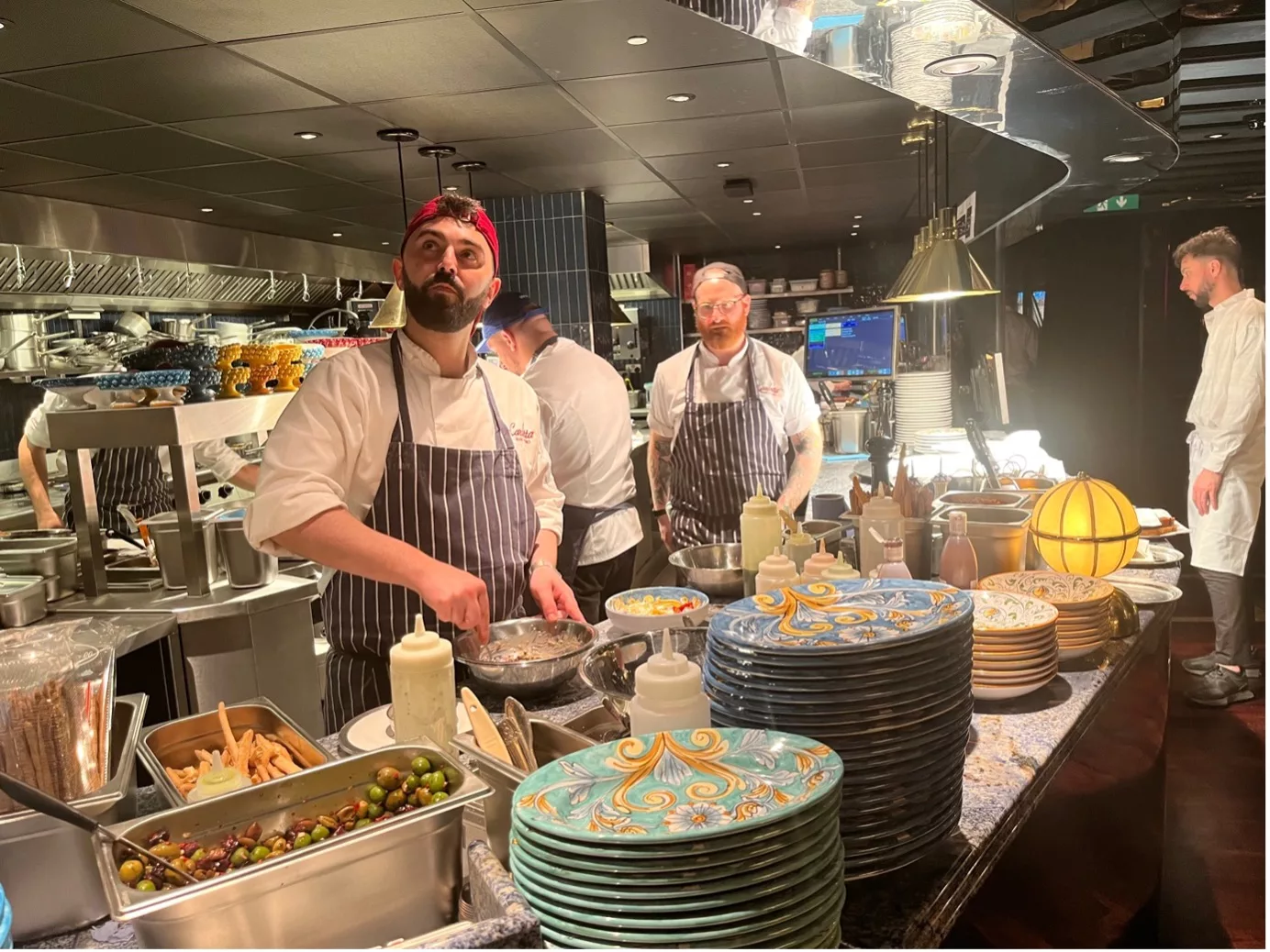The second Tuesday of Trinity is becoming a major date in the calendar for the Oxford fashion scene, host as it is to the now-annual Fashion Gala. At this year’s event, guests were witness to a runway showcase of outfits by some of Oxford’s most promising young designers. The looks ranged from floor-length statement dresses to graphic trench coats to elegant blazers and tartan two-pieces. For some, this was their second time showcasing their works in the Fashion Gala, whilst for others it was their first time having their designs publicly exhibited.
I spoke to some of the Fashion Gala designers, who told me about their background in the world of fashion and design, their pieces for this year’s gala, and where they find their inspiration.
Thomas Kemball
Thomas is a second-year student reading English at Lincoln College, but he has long been interested in the visual, having taken an art foundation year, during which he began working closely with textile art. His love for fabrics and skill at sewing only went further and further from there. Chances are, you’ve already encountered some of his work; Thomas is a veteran of fashion at Oxford. As well as the Gala, he has been involved in student plays, working as Costume Designer for the Tempest at the Oxford Playhouse in Hilary 2023, and he is styling for Mitigating Circumstances this term.
At last year’s gala, Thomas explains, he made and showcased his “first proper outfit” – a dress inspired by the Battenberg cake. If that isn’t delicious enough, this year he brought five designs to the gala, influenced by the “teatime aesthetic”. The designs were all connected by the theme of “heritage and Britain”; identity is at the core of Thomas’ designs. When asked about his fashion inspirations, Thomas cited designers like Mimi Wade, Martine Rose and Grace Bonner, and expressed particular interest in the collaboration between Louis Vuitton and the late Virgil Abloh – he finds “lots of influences everywhere”. And he certainly brought these interests together in his designs. Through the imagery of “quintessential Britishness” (including a top made out of a scone print), he explores what it means to be English – “who is allowed to be English, who looks English, who doesn’t look English”. He incorporated an array of materials, including tartan, lace and bows – very much in appropriate homage to Vivienne Westwood. Whilst the theme of identity is central to Thomas’ designs, he emphasises that he equally wants his work to be “light-hearted”. “Fashion is an art form, but it’s fun”, he tells me. He was very keen to make the process collaborative with the models who wore his designs on the runway, which he considers a chance for “showing off the person and the clothes at the same time”.
Rose Morley
Rose studies Geography at St Edmund’s Hall and is in her second year – not only of her degree, but also of showcasing her sartorial skill at the Fashion Gala. Known for her vibrant, eye-catching statement pieces, last year Rose created an elegant black dress made with blow-torched foil attachments which made heads turn.
This year’s piece was no less daring – a floor-length fuchsia gown, which Rose modelled herself, complete with a gravity-defying updo, powdered makeup and a hot pink lip. She describes her dress as “totally luxurious in a Shocking Pink satin”, which is a “delight to look at” but “rather more terrifying to stick a needle into”. I for one am glad she overcame this fear to deliver to us what was a spectacular runway look. Rose explains that the idea for the dress came from imagining what would happen “if Kylie Jenner’s Schiaparelli lion dress got put through the mind and motifs of Frieda Kahlo.” The make-up, which is quite frankly a whole art piece of its own, “takes inspiration from the incomparable Pat McGrath’s Christian Dior Spring 2007 and Autumn 2009 looks”. Meanwhile, the luscious up-do nods to the delights of Marie Antoinette, in that the “hair is a little up in the air, quite literally.” Rose raises the bottom of her skirt to show me a pair of delicate cream Mary Janes, which finished off the daintiness of this regal 18th-century look with a maximalist twist.
Rose explains that her mother is one of her inspirations in all things fashion, giving her a “childhood of going to school in period-accurate costumes for WWII dress up day or World Book Day” which “sparked the joy” for “dressing up”. Her joy for “dressing up” is very much palpable in the exquisitely adventurous looks she has brought us for two years running.
Olivia Tajo
Olivia designed and made four pieces for this year’s Fashion Gala, the first time she has displayed her designs in Oxford. Now in her second year studying English at Wadham, Olivia has ventured into the Oxford fashion scene with a bang – as well as the Gala this Trinity, she is also designing the costumes for Elspeth Rogers’ fifth week play The House. However, Olivia has long been involved in fashion design; they tell me how they first picked up sewing as an after-school activity when they were younger, as it was the only alternative to the dreaded sports option. What started as a casual hobby rapidly became an avid interest. She would flick through magazines and be especially drawn to couture designs, which she then sought to emulate in her sewing.
The two dresses which Olivia made for the Gala, they tell me, were “based on 1999 Givenchy couture”, with a distinctly “mid-summery, flowery vibe”, fitting indeed for the warmer days we are enjoying now that we are in the sunniest term of the year. The long-term use of items of clothing is something Olivia takes to heart, as she explains that she tries to maximise the wear of a garment before giving it away. Indeed, Olivia made one of the dresses from “some old bedsheets”, explaining that they “really admired the pattern” of the bedsheets and so thought they “could not leave it to waste”. And she put it to good use indeed. Her aim with the dress was to render it in some degree a piece of visual trickery, looking like it would be “impossible to make” (though she confides that it was “difficult, but not impossible”). Olivia’s second dress likewise toyed with the notion of illusion, having found its inspiration in an unlikely place: her school library. There, amidst the bookshelves, Olivia became intrigued by the book roses which the school librarian made, and then sought to apply a similar technique to dress-making, experimenting with folding fabric to create an origami-esque effect.
Lottie Oliver
After modelling in last year’s Gala, Lottie became eager to bring a design of her own to this year’s showcase. A third-year Chemistry student at Lincoln, Lottie is a proficient dabbler in the sartorial sphere, with an unconventional manner of designing; she tells me she does not “follow patterns when [she] make[s] clothes”, but has a more freestyle approach. Whether or not she plays by the fashion rules, her look for the Gala did everything right. Nodding distinctly to the aesthetic of fairytales and the magical, Lottie created an ethereal piece consisting of a pale blue dress with leafy strap sleeves and rose buds of yellow and red. The most impressive element of the design, however, were the wings, made out of real “twigs and flowers and leaves”, a dazzling collage crafted from the materials of the natural world. Much like real fairy wings, Lottie’s construction was delicate; indeed, she tells me she initially wanted to make the wings only out of sticks, but “structurally that was going to be difficult”.
She cites pantomimes and the theatre as a point of interest to her and an influence on her dramatic style of design. Her fascination with the fairy aesthetic came partly from a book she read as a child, in which the fairies’ clothes were made out of flowers. As well as this, Lottie found inspiration in the film Maleficent, especially the magnificent black horns of the eponymous character. Lottie explains that, like Maleficent’s horns, she wanted the wings of her design to “look like they were almost growing out of my back”, springing organically from the rest of the design.
Back over the COVID-19 lockdown, Lottie tells me, she transformed old curtains which her grandma offered to her “as a joke” into a piece which she recently wore to the Glitterball. Similar to Olivia’s repurposing of old bedsheets, this rings true to the theme of the gala, “buy less, choose well”, with its emphasis on using what one already has to create spectacular outfits. It is thrilling to see designers’ creativity being fuelled by what seem nondescript, everyday items.
Beth Eames
Outside her academic studies – she is working on an engineering DPhil at Balliol – Beth is known amongst her friends for making her own clothes. Whether for an Oxford ball, an evening occasion, or a work meeting, Beth tells me that her friends often come to her with requests for pieces for various occasions – and with good reason. Beth tells me that she has been enthused by clothes-making since she was a child, learning to sew as a pre-teen and developing a soon-indulged “obsession” with having a sewing machine. A pattern-drafting course she took proved significant, as, she tells me, “making your own pattern felt very important” to her at that stage, “so that I could make stuff that I actually liked” as opposed to having to use pre-made patterns. Making her own year 11 prom dress was another exciting milestone for Beth.
At the Fashion Gala, Beth showcased a sophisticated ensemble of six of her “evening wear” inspired pieces. The women’s looks, Beth tells me, are each made from “2 metres of Liberty London silk”. One of the dresses is “based on a commercial pattern”, which Beth then altered and to which she added slits and other personalising details. The designs are made from “different prints that I have loved and gotten obsessed with”, and from fabrics which are beautiful “to feel” as well as to look at. She also made a “matching linen suit”, a piece which finds its inspiration in the smart stylishness of business wear. The men’s look, a matte silk shirt, “looks more everyday”, but this does not make it any less chic – Beth is an expert in the marriage of comfort and flair.
Indeed, comfort is one of Beth’s priorities when making clothes. The urge to make occasion wear of her own came from the frustration of the difficulty of finding dresses for black tie events which both looked good and felt pleasant to wear. Making her own clothes means Beth can focus on creating pieces which are perfectly tailored to her own tastes and frame. The result are gorgeously original designs; she need not worry about arriving at a ball or elsewhere and finding herself in the same dress as someone else, nor fret about a too-low neckline or a sleeve which is too tight or too loose.
These five designers offered up a wonderfully varied range of pieces for the Gala. Each of them is at a different stage in their fashion journey, and it is pleasing to see that the Fashion Gala affords them a place to have their creativity showcased in Oxford. The guests on the night itself matched the designers’ enthusiasm for fashion, arriving in an array of outfits of varying levels of extravagance and responding vivaciously to the catwalk event. The atmosphere was exuberant, rewarding indeed for the twenty or so designers who took part in the Gala this year.




























